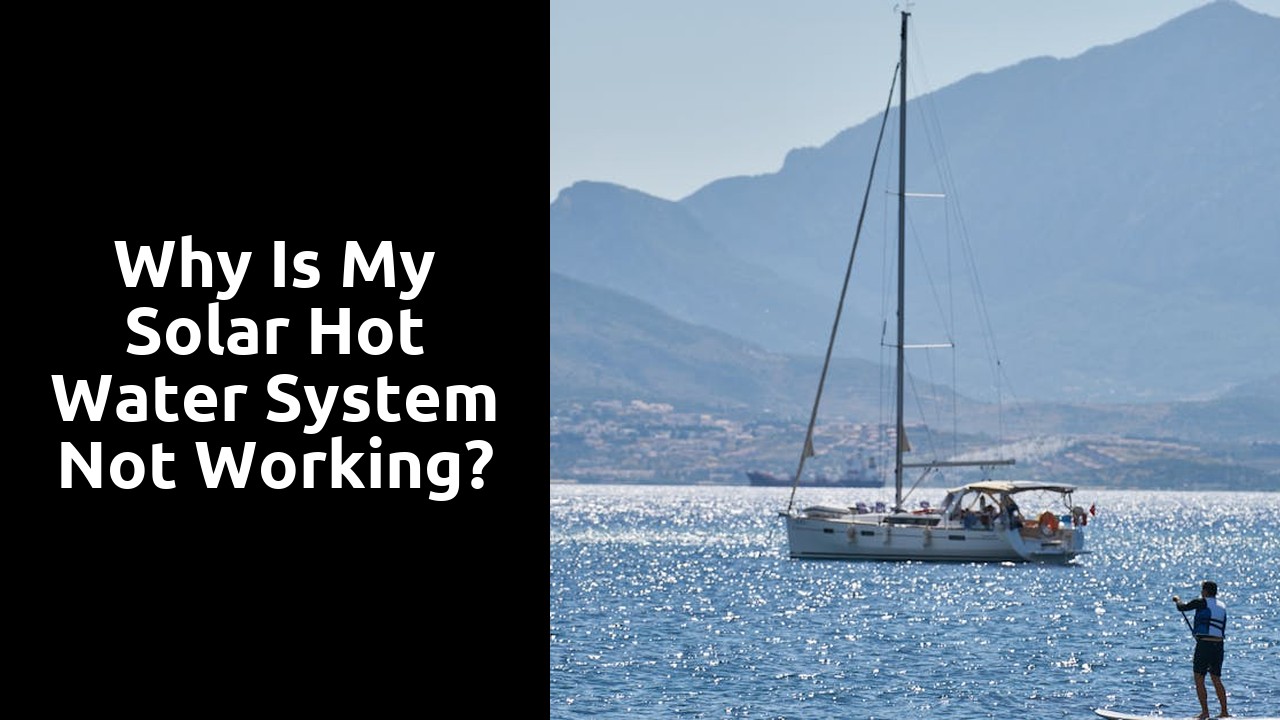
Table Of Contents
Inspecting the Insulation
Inspecting the insulation of your solar hot water system is crucial to ensure optimal performance and energy efficiency. The insulation plays a vital role in preventing heat loss, especially during colder seasons or cloudy days. By conducting a thorough inspection of the insulation, you can identify any signs of wear, tear, or damage that may compromise the system's ability to retain heat effectively. Solar Hot Water System Troubleshooting requires checking for gaps, compression, or deterioration in the insulation material to address any issues promptly.
It is recommended to visually inspect the insulation around the pipes, storage tank, and collector panels for any gaps, tears, or peeling. Additionally, ensure that the insulation is securely fastened and covers all necessary components to minimise heat loss. By maintaining the integrity of the insulation in your solar hot water system, you can enhance its performance and prolong its lifespan, ultimately saving energy and reducing operational costs in the long run.
Ensure that the insulation is intact to prevent heat loss
To ensure the effective performance of a solar hot water system, it is essential to inspect the insulation regularly. Insulation plays a crucial role in retaining heat within the system, thereby minimizing heat loss. Without intact insulation, the system may struggle to maintain optimal water temperatures, especially during colder periods or at night. Adequate insulation not only enhances the efficiency of the system but also contributes to lower energy costs and a reduced environmental impact. In the realm of Solar Hot Water System Troubleshooting, conducting a thorough check of the insulation should be a standard practice for system maintenance and longevity.
Furthermore, inspecting the insulation also involves identifying any signs of wear and tear that could compromise its effectiveness. Common issues such as gaps, tears, or thinning insulation material should be promptly addressed to prevent heat loss and maintain the system's efficiency. Regular monitoring of the insulation can help in detecting potential problems early on, allowing for timely repairs or replacements. By prioritising the integrity of the insulation in a solar hot water system, homeowners can ensure consistent and reliable performance, thus optimising the benefits of this sustainable energy solution.
Evaluating the Backup Heating System
When it comes to evaluating the backup heating system, it is crucial to ensure that it functions seamlessly during low sunlight periods. Solar hot water systems rely on sunlight to heat water efficiently, but in situations where sunlight is limited, the backup heating system becomes critical. To verify its functionality, it is advisable to run tests periodically to guarantee that it will kick in when needed. Solar Hot Water System Troubleshooting should include checking the backup heating system's settings, making sure they align with the specific requirements of the system and are adjusted for optimal performance.
Regular checks on the backup heating system can significantly contribute to the overall efficiency of your solar hot water system. By testing the backup heating system and ensuring it activates as intended, you can maintain a constant supply of hot water even when sunlight is inadequate. Moreover, verifying that the backup heating system is in good working condition minimizes the risk of disruptions and ensures that your hot water needs are consistently met. Solar Hot Water System Troubleshooting plays a vital role in identifying any issues with the backup heating system promptly, allowing for timely repairs and preventing any potential inconvenience.
Test the backup heating system to ensure functionality during low sunlight periods
When testing the backup heating system of a solar hot water system to ensure functionality during periods of low sunlight, it is crucial to verify that all components are working seamlessly. Start by examining the backup heating unit, checking for any signs of damage or wear that may impede its operation. Run a test cycle to confirm that the backup heating system kicks in when sunlight is insufficient. This step ensures that hot water supply remains consistent even when solar energy is limited. Solar Hot Water System Troubleshooting is a necessary process to maintain the efficiency of the system throughout different weather conditions, especially during overcast days or in winter when sunlight exposure is reduced. Regularly testing the backup heating system safeguards against unexpected failures and guarantees continuous hot water availability.
Monitoring the Water Flow
When monitoring the water flow of a solar hot water system, it is crucial to check the water flow rate regularly to confirm proper circulation within the system. A low water flow rate can indicate potential issues such as blockages or pump malfunctions that may impede the efficiency of the system. To troubleshoot water flow problems, start by inspecting the pipes and connections for any signs of leaks or blockages. Additionally, ensure that the pump is functioning correctly by listening for any unusual noises and checking the pressure gauges.
Proper water flow is essential for the optimal performance of a solar hot water system. Inadequate circulation can lead to inefficient heat transfer and reduced hot water production. If you encounter issues with the water flow, it is recommended to seek professional assistance to diagnose and resolve the problem promptly. By regularly monitoring the water flow and addressing any issues promptly, you can ensure the efficiency and longevity of your solar hot water system.
Check the water flow rate to confirm proper circulation within the system
Check the water flow rate to confirm proper circulation within the system. This step is crucial in Solar Hot Water System Troubleshooting as it ensures that the water is flowing smoothly through the system. A low water flow rate may indicate a blockage or an issue with the pump, which can lead to inefficient heating of the water.
Proper circulation is essential for the system to function effectively and provide hot water efficiently. By monitoring the water flow rate, you can identify any potential problems early on and address them promptly. Regularly checking the water flow rate will help maintain the performance of your solar hot water system and ensure that it continues to operate at its best.
FAQS
How can I test the insulation of my solar hot water system?
Inspect the insulation to ensure it is intact and effectively preventing heat loss from the system.
Why is it important to evaluate the backup heating system of a solar hot water system?
Testing the backup heating system ensures that it functions properly during periods of low sunlight, providing hot water consistently.
How can I monitor the water flow in my solar hot water system?
Check the water flow rate to confirm that there is proper circulation within the system, ensuring efficient operation.
What should I do if I notice a decrease in the performance of my solar hot water system?
If you observe a decline in performance, it is essential to promptly troubleshoot and address any issues to maintain the system's efficiency.
How often should I test my solar hot water system to ensure optimal performance?
Regularly testing and maintaining your solar hot water system is recommended to keep it functioning efficiently and to detect any potential problems early on.
